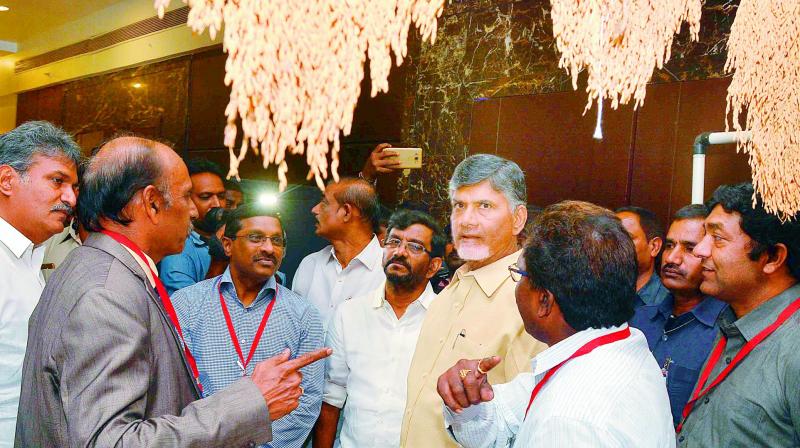AP government is focussing on agriculture, says N chandrababu Naidu
Call to develop new varieties, ensure gains.

Vijayawada: Chief Minister N. Chandrababu Naidu said on Wednesday that he was ready to implement ideas thrown up from the brainstorming sessions at the India Rice Conclave from the forthcoming Rabi season. He was speaking after inaugurating the conclave that is aimed strengthening rice production and processing for food security.
Mr Naidu has appealed to scientists and agricultural officials to develop different varieties of paddy crops to get more yield and make more profit for the farmer.
Stating that the government had interlinked the Godavari and Krishna rivers, which he called historic, he said the government was concentrating on agriculture so that farmers can benefit.
Agriculture minister Somireddy Chandra-mohan Reddy said the government was trying to provide irrigation to all regions. Dr Rajeev Singh, director general, Indian Chamber of Commerce, welcomed the gathering. MP Kesineni Srinivas, Visva Barati university vice-chancellor Swapan Kumar Datta, Acharya N.G. Ranga Agricultural University vice-chancellor V. Damodar Naidu were present special commissioner of agriculture M. Hari Jawaharlal, special chief secretary, agriculture, B. Rajasekhar and farmers were present.
Bid to boost paddy output:
Experts are working on methods to increase paddy yield in areas where it was low, and ways to divert surplus areas to different varieties to get more profit,” said scientist N.D.R.K. Sarma, co-ordinator for agriculture department. He told this newspaper on the sidelines of the India Rice Conclave that the average yield per hectare was 51.98 bags, and was grown on 23 lakh hectares. Scientists are studying how to grow associated crops with paddy and how to market them to get more profit for farmers.
Dr Sarma said varieties which have demand in other countries can be produced in AP. But such crops must be limited to areas where there is surplus production.
He has explained that developing a special variety of rice for diabetic people is not necessary. Instead of making the paddy with less glycol, people can minimise the intake, he said. Dr Sarma said, “We have to identify lands where the production is less. and provide remedies to increase yield.”

